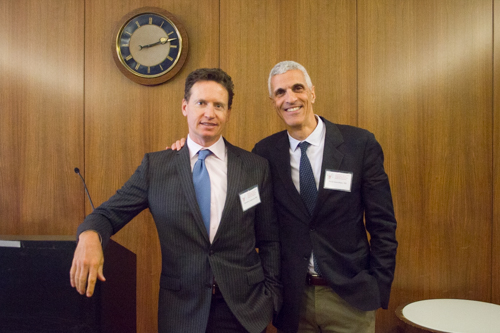
The first-ever Weill Cornell Medicine hands-on CME course in Minimally Invasive Cranial Neurosurgery was held on June 7-8, 2019. Co-directed by Dr. Theodore Schwartz and Dr. Mark Souweidane, the course allowed participants to compare dozens of advanced technologies for modern cranial surgery.
Participants from around the world attended two days of lectures and hands-on lab sessions in which they learned and then practiced new techniques and technologies in microneurosurgery, keyhole surgery, robotic navigation, endoscopic surgery, tubular surgery, and other minimally invasive approaches to cranial neurosurgery. Neurosurgeons new to endoscopes practiced navigating into bell peppers to retrieve seeds; then they applied those endoscope skills to cadavers.
A hands-on lab featured six stations showcasing the newest technologies, supported by lectures from neurosurgical experts. Highlights included a talk about DTI imaging, exoscopes, and transsulcal tubular surgery from Dr. Gustavo Pradilla of Emory University; a talk about endoscope-assisted posterior fossa surgery from Dr. John Lee of the University of Pennsylvania; a presentation about focused ultrasound from Dr. Michael Kaplitt; and a presentation about endoscopic sinus anatomy from Dr. Vijay Anand. Dr. Anand and Dr. Schwartz have for years collaborated on a hands-on course teaching endoscopic endonasal approaches; that course was the impetus behind this year’s much-expanded approach to MIS neurosurgery.
The future of neurosurgery is increasingly minimally invasive. The days of complex open craniotomies are numbered, as new technologies demonstrated in this course obviate the need for invasive surgeries. Endoscopic instruments and surgical navigational equipment, as used by participants in the course, provide alternatives to invasive surgery and, as a result, improve patient outcomes.
See the agenda and slideshow below, and subscribe to our CME mailing list to receive notifications about all of our innovative courses.